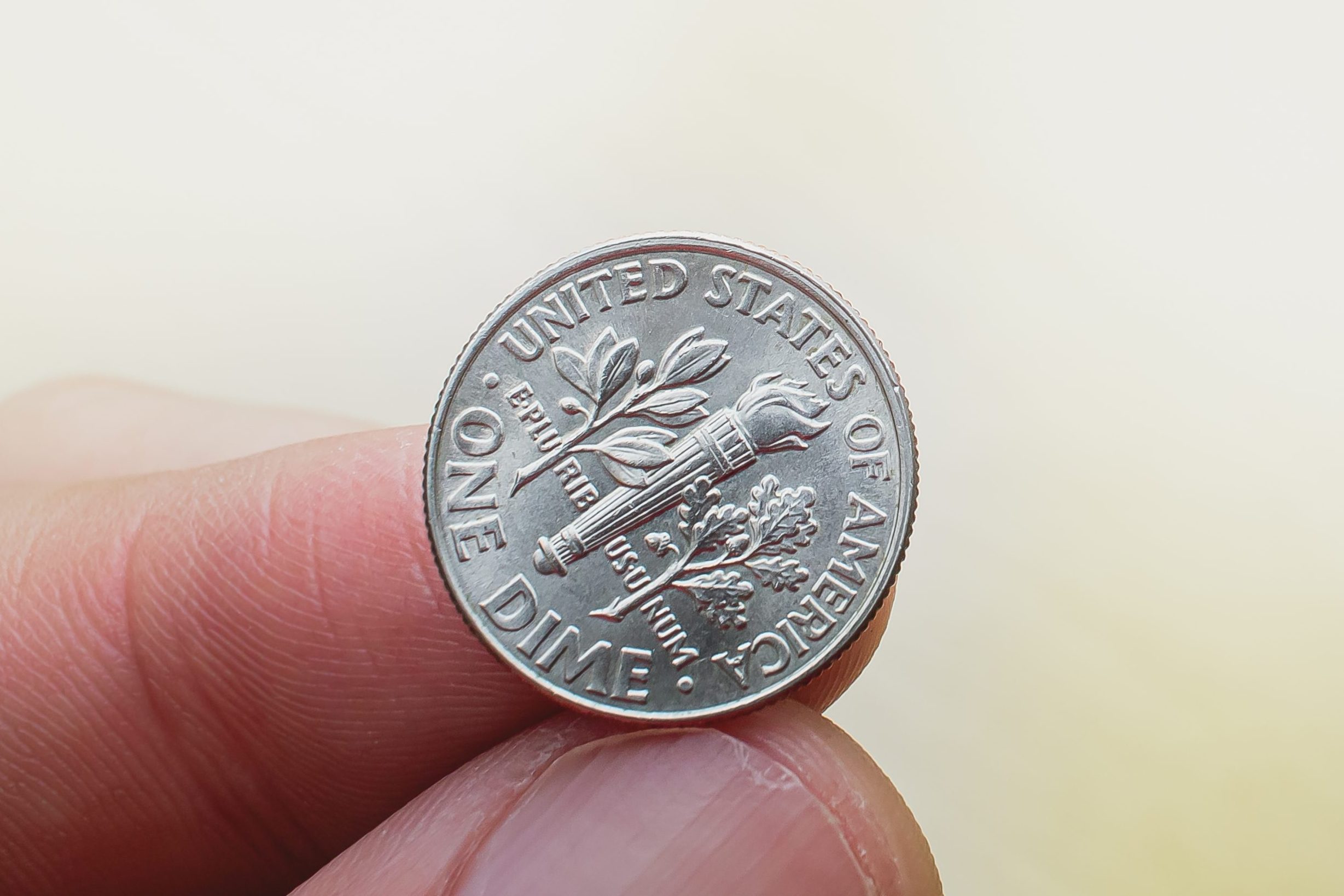This classic idiom may sound like small change, but "dime a dozen" has a rich history

Where Did the Phrase “Dime a Dozen” Come From?

A four-leaf clover? Rare. An avocado that’s perfectly ripe, right when you want to eat it? Also rare! True love? Perhaps the rarest of all. But things that are a dime a dozen? Oh, they’re everywhere—like cat videos on the internet, or socks that vanish in the dryer. We say something’s a dime a dozen to shrug it off as worthless, basic, boring or just not worth the hype. But is there a “dime a dozen” meaning that people can agree on? Where did this thrifty little phrase come from?
Reader’s Digest spoke to Michael Adams, a professor of English and linguistics at Indiana University Bloomington, to learn the origin and meaning of the phrase “dime a dozen.” Incredibly, the tale involves actual dimes, actual dozens and a whole lot of linguistic change. Read on to learn more.
Get Reader’s Digest’s Read Up newsletter for more word origins, cleaning, travel, tech, humor and fun facts all week long.
What does the phrase “dime a dozen” mean?
The saying “dime a dozen” is used to describe something so common or abundant that it holds little or no worth. Something that’s a dime a dozen is easy to come by, and not particularly special, rare or valuable.
“Obviously, at a point, it just means cheap,” Adams says. “And that’s the way we tend to use it.”
Where did the phrase “dime a dozen” originate?
Like other idioms, including “break a leg,” “spill the beans” and “take it with a grain of salt,” the phrase “dime a dozen” has interesting origins. Adams walks us through the evolution.
Earliest appearance
According to the Oxford English Dictionary, the first recorded instance of the saying was in 1895, in Minnesota’s Princeton Union newspaper:
She could get on all right with Mr. Winthrop, and she was on very good terms with Mrs. Winthrop, but she wouldn’t give a dime a dozen for the servants.
“It’s like there’s so little value there, I just couldn’t care less,” Adams says of the alliterative phrase. “And I submit to you, without any direct evidence, that it’s a euphemism for ‘I don’t give a damn.'”
The commerce connection

The 10-cent U.S. coin was first minted in 1796, when a dime could buy a fair amount more than it can today. Sellers might advertise a dozen eggs for a dime (tough to imagine, huh?), or a dozen apples for a dime, as a good deal to attract customers.
“Even when I was a kid, a dime was still a fair amount of money,” Adams says. “I would go to the five-and-dime store and be able to get 10 pieces of penny candy.” But as Adams remembers it, 10 items for a dime was the outer limit of frugality: “When you get up to a dozen [for a dime], then things are too cheap.” So if things are a dime a dozen, they’re not worth much.
Penny candy aside, by around 1930 the phrase had evolved into a figurative expression, detaching from actual pricing and instead highlighting how common or insignificant something was.
British roots
The British equivalent of “dime a dozen,” “10 a penny,” was first recorded in 1830, long before “dime a dozen” appeared in 1895. “What that tells you,” Adams says, “is that American English was looking for an equivalent to ’10 a penny.'”
In the United States in the late 19th and early 20th centuries, “it was difficult to buy more than one thing for a penny, so that wasn’t gonna work in America, at least at that time,” Adams says. “So you had to translate ’10 a penny’ into ‘dime a dozen.'”
In other words, they’re the same phrase—but “dime a dozen” was “adapted to the American situation,” says Adams.
Bridging the gap
Before “dime a dozen” came to mean something too cheap to worry about, there was already a similar saying in American English: “not worth a hill of beans,” which Adams says is an important point in the evolution of “dime a dozen.”
“You’ve got ’10 a penny’ from 1830; you’ve got ‘hill of beans’ from 1863; and you’ve got ‘dime a dozen’ in 1895,” he says. So before “dime a dozen” shows up in America, you already have the concept of worthlessness, it’s just expressed in terms of agricultural goods instead of cash. “The idea in ‘hill of beans’ is already there,” Adams says, but there’s a transition happening.
“By the 1930s, you’re beginning to see the decline of American agriculture,” Adams continues. People were moving to cities, and the concept of value and valuelessness is “going to have to be expressed in familiar terms,” Adams says. “And that’ll mean the change you have in your pocket, not the hill of beans that you just made in your garden.”
Adams stresses that “hill of beans” didn’t disappear, and “dime a dozen” didn’t spring up overnight in the 1930s. But there was a social transformation happening during that period “that would pull us away from an agricultural metaphor to a commercial one.” That’s why “dime a dozen” is to this day more common than “not worth a hill of beans.”
What are some examples of “dime a dozen” in speech?
Here are a dozen ways the phrase might be used in everyday conversation:
- “Great ideas are a dime a dozen—it’s execution that matters.”
- “In Hollywood, attractive people are a dime a dozen.”
- “Fake designer handbags? They’re a dime a dozen at the flea market.”
- “Job applicants with generic resumes are a dime a dozen these days.”
- “Oh, please! Social media influencers are a dime a dozen—she’s nothing special.”
- “During harvest season, apples around here go for a dime a dozen.”
- “A liar’s tales are worth a dime a dozen.”
- “Coffee shops with ‘hipster vibes’ and ‘artisanal beans’? In this neighborhood, they’re a dime a dozen—there’s one on every block.”
- “Pointless meetings are a dime a dozen at my company. We have meetings about planning meetings!”
- “Late homework because of a broken printer? Excuses like that are a dime a dozen.”
- “Enough with the culinary competitions! They’re a dime a dozen. I wish they’d bring back actual cooking shows.”
- “Those Motivational Monday emails? They’re a dime a dozen—and none of them has ever motivated me to do anything except roll my eyes.”
What are some examples of “dime a dozen” in pop culture?
You may have come across the expression in a play, movie or song. Here are a half-dozen examples:
- “Now pretty girls come a dime a dozen / Try to find one who’s gonna give you true loving” —“Shop Around” by Smokey Robinson & The Miracles
- BIFF: “Pop! I’m a dime a dozen, and so are you!”
WILLY [turning on him now in an uncontrolled outburst]: “I am not a dime a dozen! I am Willy Loman, and you are Biff Loman!” —Death of a Salesman by Arthur Miller - “Forget it. Her kind’s a dime a dozen.” —Rocco’s henchman Curly in the film Key Largo
- “Women like you, they’re a dime a dozen, you can buy ’em anywhere / For you to get to him I’d have to move over” —“You Ain’t Woman Enough” by Loretta Lynn
- “Daughters of Naiads were a dime a dozen in those days; the place was crawling with them. Nevertheless, it never hurts to be of semi-divine birth. Or it never hurts immediately.” —The Penelopiad by Margaret Atwood
- “Boys will come along a dime by the dozen / That ain’t nothing but 10 cent lovin'” —“Hard to Handle” by The Black Crowes
What are some other terms that mean the same as “dime a dozen”?
If you want to express that something is cheap, plentiful, ordinary or undervalued, ways to say that are a dime a dozen (sorry). Here are a dozen:
- Nothing special
- Garden variety
- A penny a pound
- Run-of-the-mill
- Common as dirt
- Nothing to write home about
- Unremarkable
- Commonplace
- Everywhere you turn
- Nothing special
- Bargain basement
- Dirt cheap
So the next time you dismiss something as a “dime a dozen,” remember that this unassuming phrase is more than just a throwaway line: It’s a little coin of cultural history, minted in meaning. And though the things it describes may be ordinary, the expression itself? Priceless.
About the expert
|
Why trust us
At Reader’s Digest, we’re committed to producing high-quality content by writers with expertise and experience in their field in consultation with relevant, qualified experts. We rely on reputable primary sources, including government and professional organizations and academic institutions as well as our writers’ personal experiences where appropriate. We verify all facts and data, back them with credible sourcing and revisit them over time to ensure they remain accurate and up to date. Read more about our team, our contributors and our editorial policies.
Sources:
- Michael Adams, professor of English and linguistics at Indiana University Bloomington; phone interview, April 14, 2025
- Oxford English Dictionary: “Dime”
- Oxford English Dictionary: “Penny”
- Phrase Finder: “What’s the Meaning of the Phrase ‘A Dime a Dozen’?”























